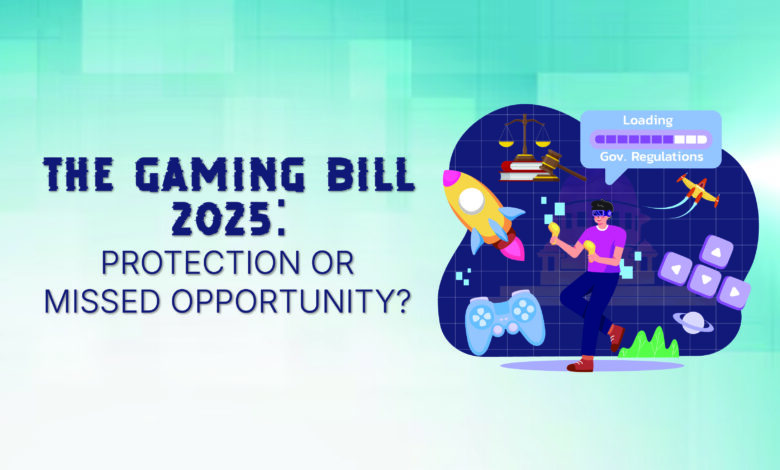
Why India Needs Smarter Regulation, Not a Blanket Ban
Introduction
The online gaming industry in India has grown at breakneck speed over the past decade. From casual games on smartphones to real-money platforms offering fantasy sports, poker, rummy, and esports, this digital ecosystem has captured millions of young Indians.
But with opportunity comes risk. Recently, Prime Minister Narendra Modi raised concerns, stating that 45 crore youngsters collectively lost nearly ₹20,000 crore due to online gaming addiction. In response, the Online Gaming Bill 2025 has proposed a blanket ban on all real-money games.
While the intention is to protect users, critics argue that banning an entire industry is both rare and extreme. Instead, regulation may be a wiser route, one that balances innovation, consumer safety, and economic growth.
Let’s break this down in detail.
The Indian Online Gaming Landscape
India is home to one of the fastest-growing gaming markets in the world. Factors like cheap internet, affordable smartphones, and a young population have fueled this boom.
- User Base: India has over 500 million gamers, making it the second-largest gaming community globally after China.
- Revenue Growth: According to EY and FICCI reports, the Indian gaming market is projected to touch $8.6 billion by 2027, with real-money gaming accounting for more than 50%.
- Startups: More than 2,000 startups operate in this space, many of them funded by global investors.
But while the growth story is impressive, the industry has also drawn criticism for addictive patterns and financial losses, especially among youngsters.
What’s at Risk with a Blanket Ban?
The bill aims to ban all forms of real-money gaming, which includes fantasy sports, card games, skill-based games, and casual paid tournaments. Let’s understand the consequences in detail:
1. Employment: 2 Lakh Jobs on the Line
The gaming sector doesn’t only employ coders. It creates jobs in design, content creation, customer support, marketing, animation, and event management. Around 200,000 people could be directly affected, with many more indirectly depending on this ecosystem.
Imagine the impact if overnight these companies shut shop young professionals, many of whom left traditional IT jobs to join gaming startups, would face sudden unemployment.
2. Tax Revenue: ₹20,000 Crore Annually
The government currently earns ₹20,000 crore in GST and other taxes from online gaming. In an economy striving to boost fiscal strength, losing such revenue would create a void.
Moreover, states like Karnataka, Maharashtra, and Delhi benefit heavily from this revenue stream. A blanket ban risks widening state budget deficits, especially in sectors like healthcare and infrastructure that rely on tax inflows.
3. Startups: More than 2,000 at Risk
India’s startup ecosystem is often hailed as the third-largest in the world. Online gaming startups form a significant chunk of this digital revolution.
From fantasy sports giants like Dream11 and Mobile Premier League (MPL) to niche platforms offering quizzes and casual games, thousands of entrepreneurs are pushing boundaries. A sudden ban would discourage not just gaming founders, but future entrepreneurs across digital sectors, who might fear abrupt policy reversals.
4. Advertising Economy: ₹6,000 Crore in Yearly Spend
Gaming companies are among the top digital advertisers in India. Their ₹6,000 crore annual spending supports television channels, OTT platforms, YouTubers, and influencers.
For example, during the IPL season, fantasy sports platforms dominate ad slots, providing critical revenue to broadcasters. Without this spending, entire sections of India’s media and advertising ecosystem would shrink.
5. Foreign Direct Investments: ₹23,000 Crore Over 5 Years
In the past five years, gaming startups have attracted ₹23,000 crore in FDI. International investors see India as a promising digital market, second only to the US and China in potential.
A sudden ban would shatter this confidence, leading investors to rethink future bets not just in gaming, but also in adjacent sectors like fintech, e-commerce, and AI startups. Investor trust, once broken, takes years to rebuild.
Why a Total Ban Could Backfire
While the intent is to protect young users, banning the industry altogether can have unintended consequences.
1. Emergence of an Underground Market
History shows us that bans often push demand underground. Just as prohibition led to bootlegging in the US, an online gaming ban may give rise to illegal, unregulated betting networks.
These platforms would operate without tax compliance, consumer protection, or responsible gaming checks exposing users to greater fraud and addiction risks.
2. Loss of Innovation
Gaming is not just entertainment, it’s a hotbed of innovation in AI, AR/VR, blockchain, and fintech integration. Banning real-money gaming could derail technological progress that has spillover benefits across other industries.
3. Discouraging Entrepreneurship
India has often positioned itself as a global startup hub. But sudden regulatory shocks can discourage entrepreneurs from venturing into new-age sectors. The fear of “policy U-turns” can stifle creativity and risk-taking, core ingredients of innovation.
4. Global Reputation
A ban could signal to the world that India is an unpredictable market with policy volatility. This is dangerous at a time when India wants to attract global capital and position itself as a digital powerhouse.
Global Perspectives: How Other Countries Handle Online Gaming
Instead of bans, most countries adopt regulation-first approaches.
- United Kingdom: Has one of the most advanced gaming regulatory systems, with strict licensing, age checks, and advertising rules. Tax revenue from gaming funds public welfare.
- United States: Online sports betting is regulated at the state level. States like New Jersey and Nevada earn billions annually in taxes while ensuring user protection.
- Singapore: Implements strong safeguards such as daily spending limits and self-exclusion programs, but gaming itself is legal.
- China: Introduced strict playtime limits for minors instead of banning the industry entirely.
These examples show that regulation is a smarter alternative than blanket bans.
What India Can Do Instead
A middle path exists protecting vulnerable users while preserving innovation and economic gains.
1. Strict Age Verification
Platforms should enforce KYC-based verification, ensuring minors cannot access real-money games.
2. Spending Limits & Cooling-Off Periods
Daily or monthly spending caps can prevent excessive losses. Platforms could also introduce “cooling-off periods” where users are automatically restricted after continuous play.
3. Self-Exclusion Programs
Just like casinos abroad, Indian gaming platforms could allow users to voluntarily suspend accounts if they sense addictive behaviour.
4. Transparent Taxation & Audits
Mandatory audits and transparent tax remittances can build government trust while deterring fraud.
5. Public Awareness Campaigns
Governments and platforms can co-create financial literacy campaigns, educating youth on responsible gameplay and the dangers of addiction.
6. Self-Regulatory Bodies
An industry-backed regulator, supervised by the government, could create guidelines for advertising, user protection, and dispute resolution.
The Balanced Path: Growth with Accountability
If India opts for regulation, here’s what could be achieved:
- Retain 2 lakh jobs
- Secure ₹20,000 crore in tax revenue
- Keep 2,000+ startups alive
- Maintain investor confidence
- Protect consumers through safeguards
This way, the ecosystem survives while risks are minimized.
Conclusion
The Online Gaming Bill 2025 raises an important concern: protecting India’s youth from addiction. But a blanket ban is a blunt instrument, one that could harm jobs, startups, tax revenue, and global investor trust.
Instead, India should look toward heavy regulation, responsible gaming frameworks, and age restrictions. This approach ensures accountability while still nurturing innovation.
Bans kill industries. Smart regulations shape them responsibly. And India, with its digital ambitions, cannot afford to lose a sector that fuels jobs, tax revenue, and global recognition.
BY- RINAL RATHI




